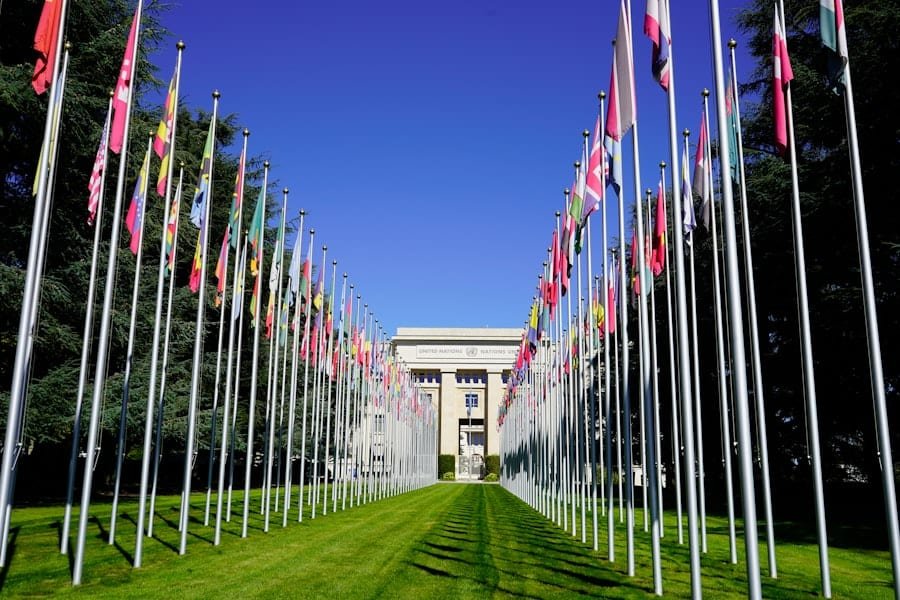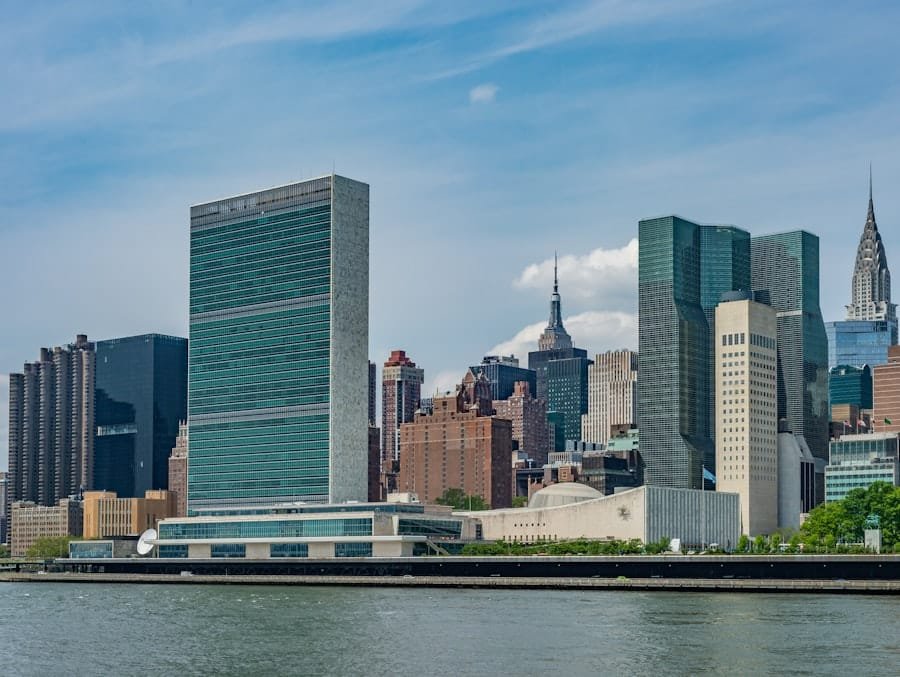International organizations play a vital role in global welfare economics by addressing diverse social, economic, and environmental issues that impact people worldwide. These entities are established to foster cooperation and coordination among nations in tackling shared challenges and achieving common objectives. Their work focuses on promoting sustainable development, reducing poverty and inequality, and ensuring fair trade and economic justice.
Additionally, international organizations are instrumental in addressing global challenges such as climate change, pandemics, and humanitarian crises. Through collaborative efforts, these organizations can significantly improve global welfare. Key international organizations involved in global welfare economics include the United Nations, World Bank, International Monetary Fund, World Trade Organization, and various specialized agencies and programs.
These entities provide a forum for nations to discuss and address common challenges, exchange best practices, and coordinate efforts towards shared goals. They also offer technical assistance, financial support, and policy guidance to help countries implement effective strategies for improving their citizens’ welfare. Through their collective efforts, international organizations contribute to the creation of a more equitable and sustainable world for all.
Key Takeaways
- International organizations play a crucial role in global welfare economics by addressing issues such as poverty, inequality, and sustainable development.
- Cooperation and coordination among international organizations are essential for effectively addressing global challenges and maximizing impact.
- International organizations play a key role in addressing global poverty and inequality through various initiatives and programs.
- International organizations have a significant impact on promoting sustainable development through policies, funding, and capacity-building efforts.
- International organizations play a vital role in promoting fair trade and economic justice by setting standards, providing support, and advocating for equitable practices.
The Importance of Cooperation and Coordination among International Organizations
Effective Use of Resources
These organizations often have overlapping mandates and areas of expertise, and by working together, they can leverage their respective strengths and resources to address common challenges more effectively. Cooperation and coordination also help avoid duplication of efforts and ensure that resources are used efficiently to achieve maximum impact.
Alignment with National Priorities
Furthermore, international organizations often work with national governments, non-governmental organizations, and other stakeholders to implement their programs and initiatives. By coordinating their efforts, they can ensure that their interventions are aligned with national priorities and are implemented in a coherent and complementary manner. This can help maximize the impact of their interventions and ensure that they are sustainable in the long term.
Building Trust and Partnerships
Cooperation and coordination among international organizations also help build trust and foster partnerships among countries and other stakeholders. By working together towards common goals, these organizations can help build consensus on key issues and promote a shared understanding of the challenges at hand. This can help create a more conducive environment for dialogue and collaboration, which is essential for addressing complex global challenges.
The Role of International Organizations in Addressing Global Poverty and Inequality

International organizations play a crucial role in addressing global poverty and inequality by providing financial support, technical assistance, and policy advice to help countries implement effective strategies to reduce poverty and promote inclusive growth. They also work towards promoting social protection systems, access to education and healthcare, and creating economic opportunities for marginalized communities. By addressing the root causes of poverty and inequality, international organizations contribute to creating a more equitable world for all.
Furthermore, international organizations often work with national governments, non-governmental organizations, and other stakeholders to implement their programs and initiatives. By coordinating their efforts, they can ensure that their interventions are aligned with national priorities and are implemented in a coherent and complementary manner. This can help maximize the impact of their interventions and ensure that they are sustainable in the long term.
Cooperation and coordination among international organizations also help build trust and foster partnerships among countries and other stakeholders. By working together towards common goals, these organizations can help build consensus on key issues and promote a shared understanding of the challenges at hand. This can help create a more conducive environment for dialogue and collaboration, which is essential for addressing complex global challenges.
The Impact of International Organizations on Promoting Sustainable Development
International organizations have a significant impact on promoting sustainable development by supporting countries in implementing policies and programs that promote economic growth, social inclusion, and environmental sustainability. They provide financial support, technical assistance, and policy advice to help countries integrate sustainable development principles into their national development plans. They also work towards promoting renewable energy, sustainable agriculture, climate resilience, and environmental conservation.
By promoting sustainable development, international organizations contribute to creating a more resilient and environmentally friendly world for future generations. Furthermore, international organizations often work with national governments, non-governmental organizations, and other stakeholders to implement their programs and initiatives. By coordinating their efforts, they can ensure that their interventions are aligned with national priorities and are implemented in a coherent and complementary manner.
This can help maximize the impact of their interventions and ensure that they are sustainable in the long term. Cooperation and coordination among international organizations also help build trust and foster partnerships among countries and other stakeholders. By working together towards common goals, these organizations can help build consensus on key issues and promote a shared understanding of the challenges at hand.
This can help create a more conducive environment for dialogue and collaboration, which is essential for addressing complex global challenges.
The Role of International Organizations in Promoting Fair Trade and Economic Justice
International organizations play a crucial role in promoting fair trade and economic justice by advocating for trade policies that are fair, transparent, and inclusive. They work towards reducing trade barriers, promoting market access for developing countries, and ensuring that trade agreements benefit all parties involved. They also support initiatives that promote ethical business practices, labor rights, and environmental sustainability in global supply chains.
By promoting fair trade and economic justice, international organizations contribute to creating a more equitable global economy for all. Furthermore, international organizations often work with national governments, non-governmental organizations, and other stakeholders to implement their programs and initiatives. By coordinating their efforts, they can ensure that their interventions are aligned with national priorities and are implemented in a coherent and complementary manner.
This can help maximize the impact of their interventions and ensure that they are sustainable in the long term. Cooperation and coordination among international organizations also help build trust and foster partnerships among countries and other stakeholders. By working together towards common goals, these organizations can help build consensus on key issues and promote a shared understanding of the challenges at hand.
This can help create a more conducive environment for dialogue and collaboration, which is essential for addressing complex global challenges.
The Challenges and Limitations of International Organizations in Promoting Global Welfare Economics

Financial Constraints
One of the primary challenges is the lack of adequate funding to support their programs and initiatives. Many international organizations rely on voluntary contributions from member states, which may not always be sufficient to address the scale of global challenges they are tasked with addressing. This can limit their ability to implement effective interventions and achieve meaningful impact.
Political and Institutional Barriers
Another challenge is the lack of political will among member states to implement the policies and reforms advocated by international organizations. Many countries may prioritize their national interests over global welfare concerns, which can hinder the effectiveness of international organizations in addressing common challenges. Additionally, some international organizations may face resistance from powerful interest groups or face political pressure that limits their ability to implement effective interventions.
Importance of Cooperation and Coordination
Despite these challenges, international organizations can maximize their impact by working together with national governments, non-governmental organizations, and other stakeholders to implement their programs and initiatives. By coordinating their efforts, they can ensure that their interventions are aligned with national priorities and are implemented in a coherent and complementary manner. This can help build trust and foster partnerships among countries and other stakeholders, creating a more conducive environment for dialogue and collaboration to address complex global challenges.
The Future of International Organizations in Promoting Global Welfare Economics
The future of international organizations in promoting global welfare economics will depend on their ability to adapt to evolving global challenges, leverage new technologies, mobilize resources effectively, and build strong partnerships with member states, non-governmental organizations, businesses, academia, and other stakeholders. International organizations will need to continue advocating for policies that promote inclusive growth, social protection systems, environmental sustainability, fair trade practices, and economic justice. Furthermore, international organizations often work with national governments, non-governmental organizations, and other stakeholders to implement their programs and initiatives.
By coordinating their efforts, they can ensure that their interventions are aligned with national priorities and are implemented in a coherent and complementary manner. This can help maximize the impact of their interventions and ensure that they are sustainable in the long term. Cooperation and coordination among international organizations also help build trust and foster partnerships among countries and other stakeholders.
By working together towards common goals, these organizations can help build consensus on key issues and promote a shared understanding of the challenges at hand. This can help create a more conducive environment for dialogue and collaboration, which is essential for addressing complex global challenges. In conclusion, international organizations play a crucial role in promoting global welfare economics by addressing various social, economic, environmental issues that affect the well-being of people around the world.
Cooperation among these organizations is essential for addressing complex global challenges effectively while building trust among countries to foster partnerships among them. Despite facing various challenges such as lack of funding or political will from member states to implement policies advocated by them; international organizations will need to continue advocating for policies that promote inclusive growth while adapting to evolving global challenges to ensure a more equitable world for all.
If you’re interested in learning more about the role of international organizations in promoting global welfare economics, you may want to check out this article on The Econosphere’s website: The Econosphere. This website covers a wide range of economic topics and provides valuable insights into the impact of international organizations on global welfare. It’s a great resource for anyone looking to deepen their understanding of this important issue.
FAQs
What are international organizations?
International organizations are entities formed by countries to address global issues and promote cooperation among nations. They can include intergovernmental organizations, non-governmental organizations, and multinational corporations.
What is global welfare economics?
Global welfare economics is a branch of economics that focuses on the well-being and quality of life of individuals and communities around the world. It considers factors such as income distribution, access to resources, and overall societal welfare.
How do international organizations promote global welfare economics?
International organizations promote global welfare economics by addressing issues such as poverty, inequality, healthcare, education, and environmental sustainability on a global scale. They work to create policies, provide aid, and facilitate cooperation among countries to improve overall welfare.
What are some examples of international organizations involved in promoting global welfare economics?
Examples of international organizations involved in promoting global welfare economics include the United Nations, World Bank, International Monetary Fund, World Health Organization, and various non-governmental organizations focused on humanitarian aid and development.
What are the challenges faced by international organizations in promoting global welfare economics?
Challenges faced by international organizations in promoting global welfare economics include political conflicts, resource constraints, cultural differences, and the need for coordination among diverse stakeholders. Additionally, ensuring accountability and transparency in their efforts can be a challenge.








